Reflective Journal: Social Work Practice in Nepal, Ethics, and UPR
VerifiedAdded on 2023/01/23
|10
|2723
|32
Journal and Reflective Writing
AI Summary
This reflective journal explores the student's personal values in relation to social work practice, particularly within the context of Nepal. It examines the AASW code of ethics, analyzing how ethical positions align with the student's values and potential challenges. The journal delves into the core ethical position of unconditional positive regard (UPR), discussing its significance in social work and the challenges it might present for practitioners. The student reflects on real-world scenarios and academic resources to illustrate these concepts, providing a comprehensive analysis of ethical considerations in social work practice.
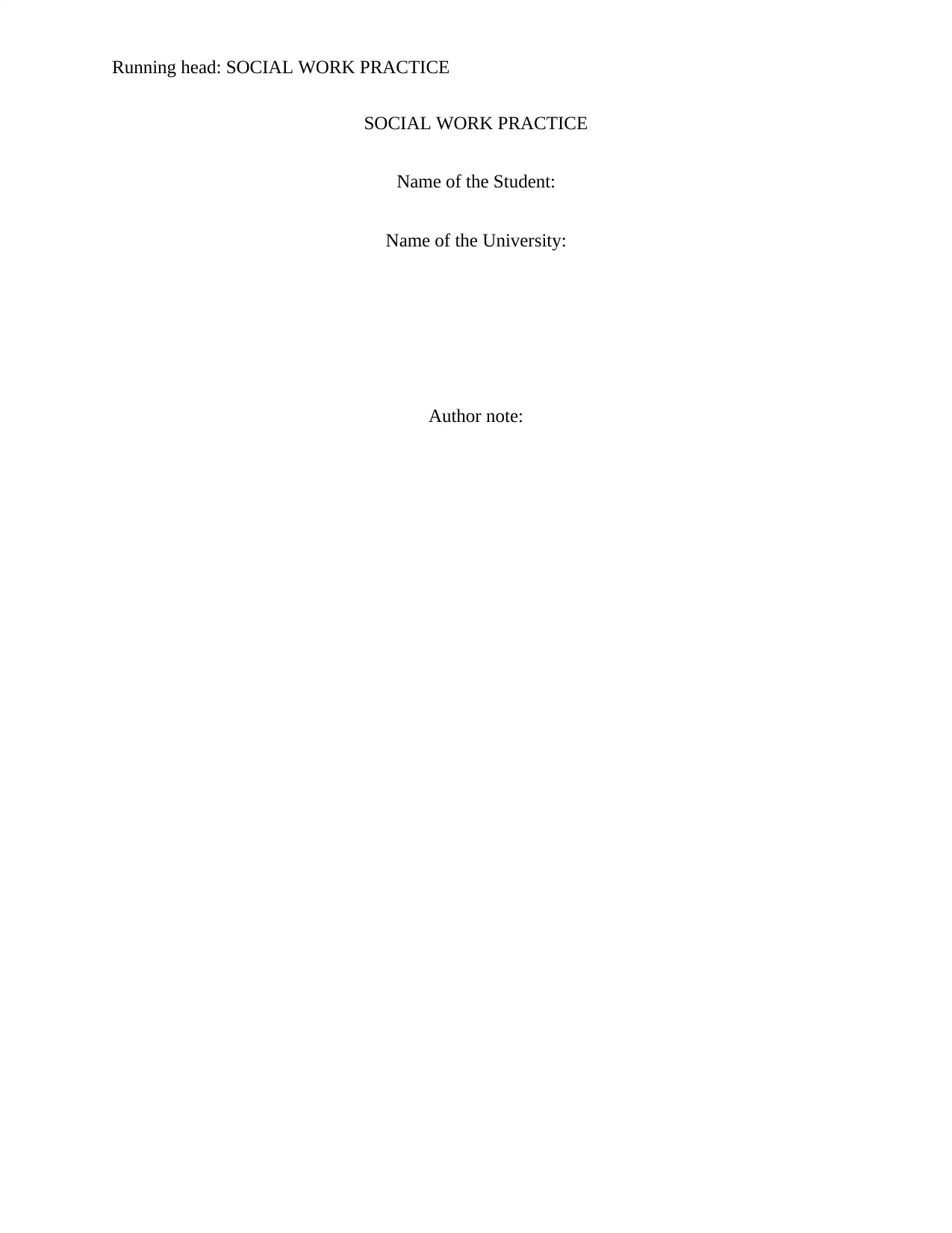
Running head: SOCIAL WORK PRACTICE
SOCIAL WORK PRACTICE
Name of the Student:
Name of the University:
Author note:
SOCIAL WORK PRACTICE
Name of the Student:
Name of the University:
Author note:
Paraphrase This Document
Need a fresh take? Get an instant paraphrase of this document with our AI Paraphraser
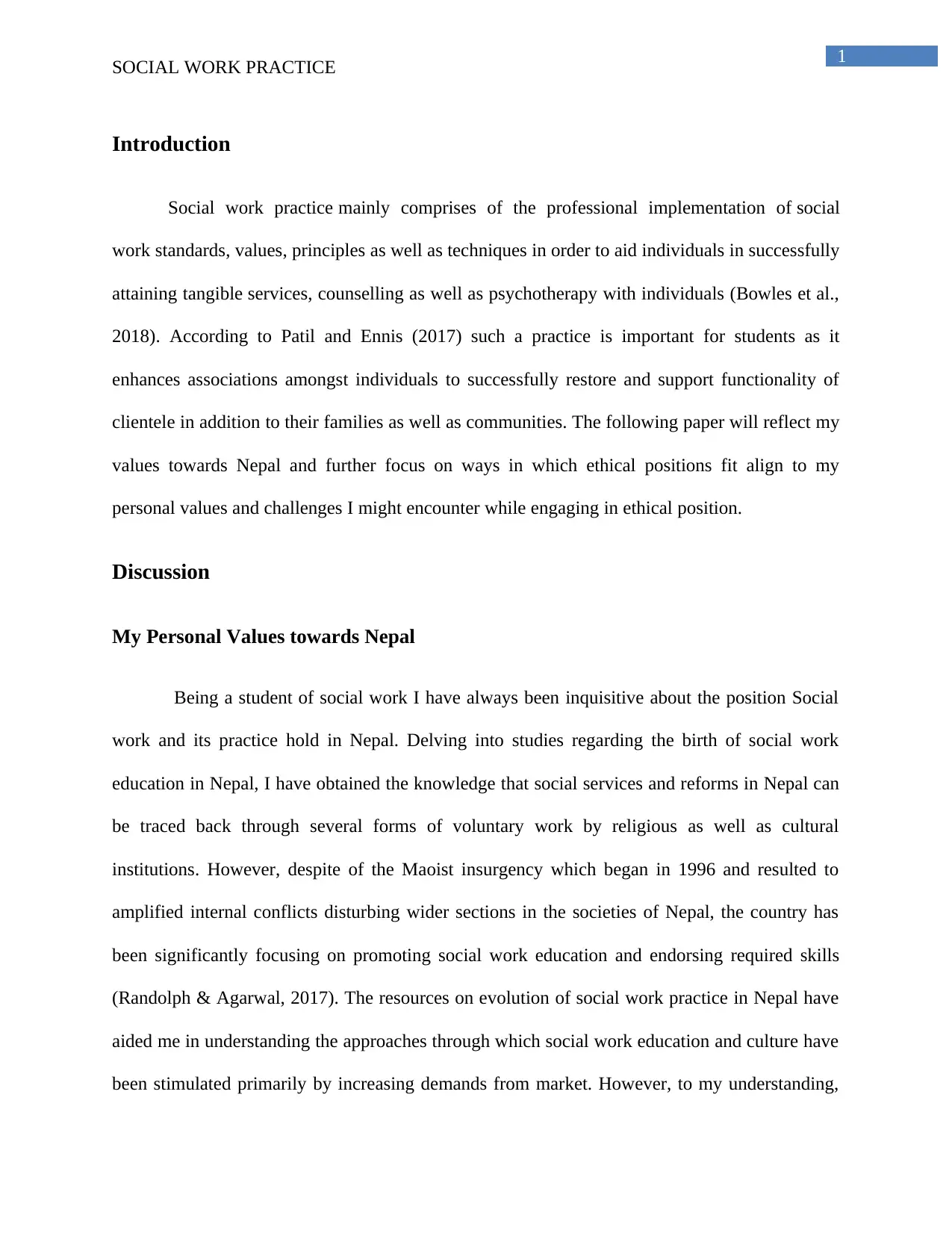
1
SOCIAL WORK PRACTICE
Introduction
Social work practice mainly comprises of the professional implementation of social
work standards, values, principles as well as techniques in order to aid individuals in successfully
attaining tangible services, counselling as well as psychotherapy with individuals (Bowles et al.,
2018). According to Patil and Ennis (2017) such a practice is important for students as it
enhances associations amongst individuals to successfully restore and support functionality of
clientele in addition to their families as well as communities. The following paper will reflect my
values towards Nepal and further focus on ways in which ethical positions fit align to my
personal values and challenges I might encounter while engaging in ethical position.
Discussion
My Personal Values towards Nepal
Being a student of social work I have always been inquisitive about the position Social
work and its practice hold in Nepal. Delving into studies regarding the birth of social work
education in Nepal, I have obtained the knowledge that social services and reforms in Nepal can
be traced back through several forms of voluntary work by religious as well as cultural
institutions. However, despite of the Maoist insurgency which began in 1996 and resulted to
amplified internal conflicts disturbing wider sections in the societies of Nepal, the country has
been significantly focusing on promoting social work education and endorsing required skills
(Randolph & Agarwal, 2017). The resources on evolution of social work practice in Nepal have
aided me in understanding the approaches through which social work education and culture have
been stimulated primarily by increasing demands from market. However, to my understanding,
SOCIAL WORK PRACTICE
Introduction
Social work practice mainly comprises of the professional implementation of social
work standards, values, principles as well as techniques in order to aid individuals in successfully
attaining tangible services, counselling as well as psychotherapy with individuals (Bowles et al.,
2018). According to Patil and Ennis (2017) such a practice is important for students as it
enhances associations amongst individuals to successfully restore and support functionality of
clientele in addition to their families as well as communities. The following paper will reflect my
values towards Nepal and further focus on ways in which ethical positions fit align to my
personal values and challenges I might encounter while engaging in ethical position.
Discussion
My Personal Values towards Nepal
Being a student of social work I have always been inquisitive about the position Social
work and its practice hold in Nepal. Delving into studies regarding the birth of social work
education in Nepal, I have obtained the knowledge that social services and reforms in Nepal can
be traced back through several forms of voluntary work by religious as well as cultural
institutions. However, despite of the Maoist insurgency which began in 1996 and resulted to
amplified internal conflicts disturbing wider sections in the societies of Nepal, the country has
been significantly focusing on promoting social work education and endorsing required skills
(Randolph & Agarwal, 2017). The resources on evolution of social work practice in Nepal have
aided me in understanding the approaches through which social work education and culture have
been stimulated primarily by increasing demands from market. However, to my understanding,
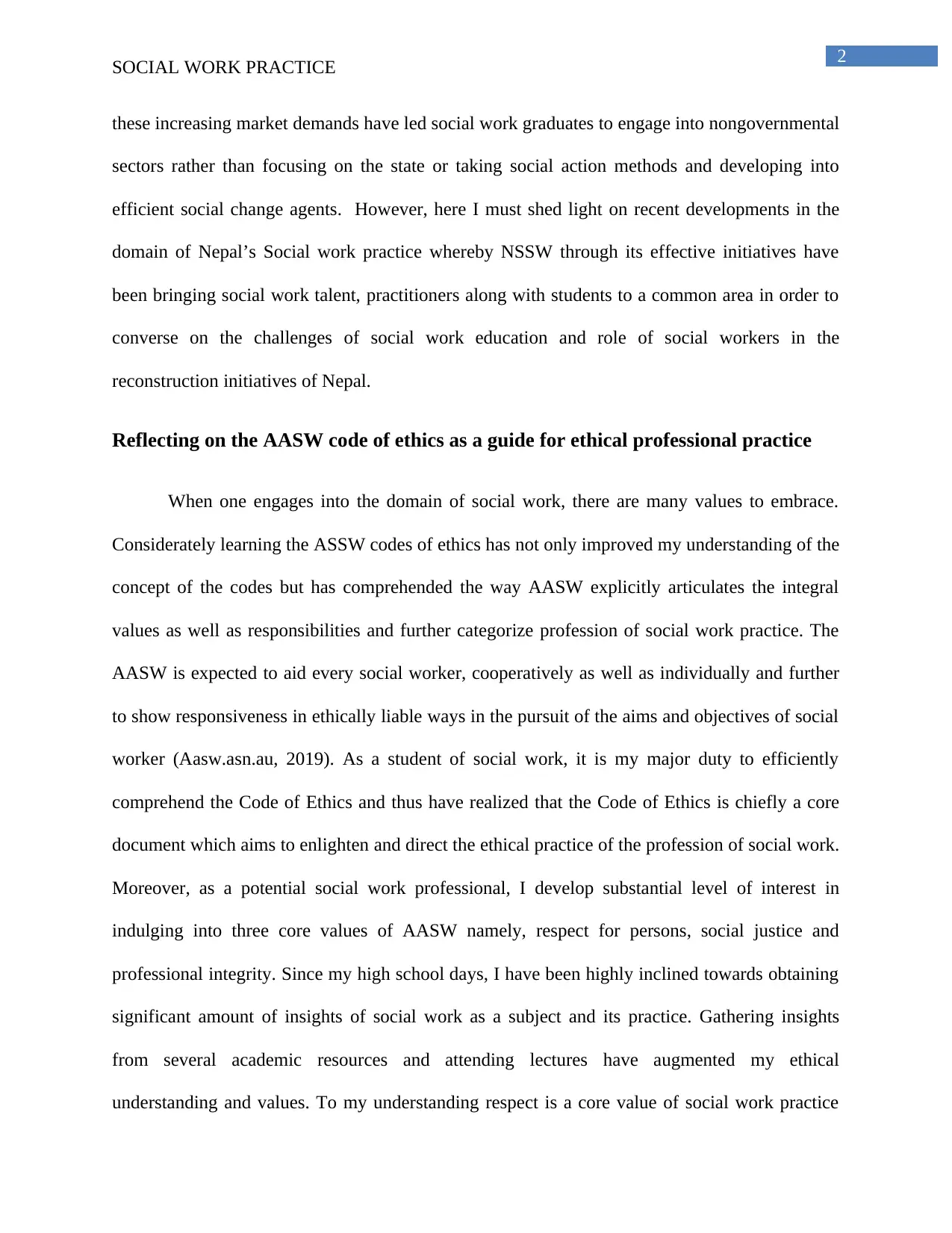
2
SOCIAL WORK PRACTICE
these increasing market demands have led social work graduates to engage into nongovernmental
sectors rather than focusing on the state or taking social action methods and developing into
efficient social change agents. However, here I must shed light on recent developments in the
domain of Nepal’s Social work practice whereby NSSW through its effective initiatives have
been bringing social work talent, practitioners along with students to a common area in order to
converse on the challenges of social work education and role of social workers in the
reconstruction initiatives of Nepal.
Reflecting on the AASW code of ethics as a guide for ethical professional practice
When one engages into the domain of social work, there are many values to embrace.
Considerately learning the ASSW codes of ethics has not only improved my understanding of the
concept of the codes but has comprehended the way AASW explicitly articulates the integral
values as well as responsibilities and further categorize profession of social work practice. The
AASW is expected to aid every social worker, cooperatively as well as individually and further
to show responsiveness in ethically liable ways in the pursuit of the aims and objectives of social
worker (Aasw.asn.au, 2019). As a student of social work, it is my major duty to efficiently
comprehend the Code of Ethics and thus have realized that the Code of Ethics is chiefly a core
document which aims to enlighten and direct the ethical practice of the profession of social work.
Moreover, as a potential social work professional, I develop substantial level of interest in
indulging into three core values of AASW namely, respect for persons, social justice and
professional integrity. Since my high school days, I have been highly inclined towards obtaining
significant amount of insights of social work as a subject and its practice. Gathering insights
from several academic resources and attending lectures have augmented my ethical
understanding and values. To my understanding respect is a core value of social work practice
SOCIAL WORK PRACTICE
these increasing market demands have led social work graduates to engage into nongovernmental
sectors rather than focusing on the state or taking social action methods and developing into
efficient social change agents. However, here I must shed light on recent developments in the
domain of Nepal’s Social work practice whereby NSSW through its effective initiatives have
been bringing social work talent, practitioners along with students to a common area in order to
converse on the challenges of social work education and role of social workers in the
reconstruction initiatives of Nepal.
Reflecting on the AASW code of ethics as a guide for ethical professional practice
When one engages into the domain of social work, there are many values to embrace.
Considerately learning the ASSW codes of ethics has not only improved my understanding of the
concept of the codes but has comprehended the way AASW explicitly articulates the integral
values as well as responsibilities and further categorize profession of social work practice. The
AASW is expected to aid every social worker, cooperatively as well as individually and further
to show responsiveness in ethically liable ways in the pursuit of the aims and objectives of social
worker (Aasw.asn.au, 2019). As a student of social work, it is my major duty to efficiently
comprehend the Code of Ethics and thus have realized that the Code of Ethics is chiefly a core
document which aims to enlighten and direct the ethical practice of the profession of social work.
Moreover, as a potential social work professional, I develop substantial level of interest in
indulging into three core values of AASW namely, respect for persons, social justice and
professional integrity. Since my high school days, I have been highly inclined towards obtaining
significant amount of insights of social work as a subject and its practice. Gathering insights
from several academic resources and attending lectures have augmented my ethical
understanding and values. To my understanding respect is a core value of social work practice
⊘ This is a preview!⊘
Do you want full access?
Subscribe today to unlock all pages.

Trusted by 1+ million students worldwide
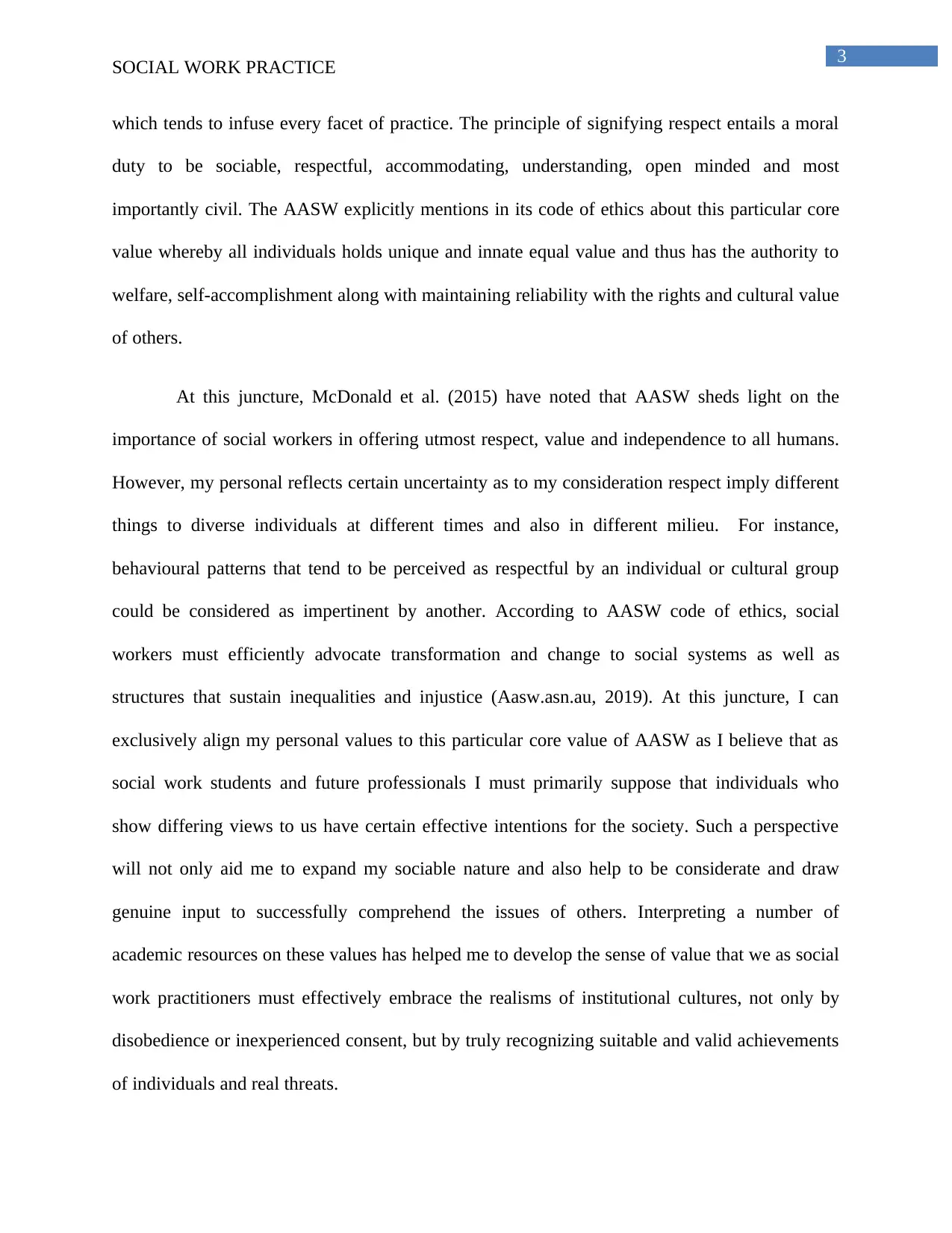
3
SOCIAL WORK PRACTICE
which tends to infuse every facet of practice. The principle of signifying respect entails a moral
duty to be sociable, respectful, accommodating, understanding, open minded and most
importantly civil. The AASW explicitly mentions in its code of ethics about this particular core
value whereby all individuals holds unique and innate equal value and thus has the authority to
welfare, self-accomplishment along with maintaining reliability with the rights and cultural value
of others.
At this juncture, McDonald et al. (2015) have noted that AASW sheds light on the
importance of social workers in offering utmost respect, value and independence to all humans.
However, my personal reflects certain uncertainty as to my consideration respect imply different
things to diverse individuals at different times and also in different milieu. For instance,
behavioural patterns that tend to be perceived as respectful by an individual or cultural group
could be considered as impertinent by another. According to AASW code of ethics, social
workers must efficiently advocate transformation and change to social systems as well as
structures that sustain inequalities and injustice (Aasw.asn.au, 2019). At this juncture, I can
exclusively align my personal values to this particular core value of AASW as I believe that as
social work students and future professionals I must primarily suppose that individuals who
show differing views to us have certain effective intentions for the society. Such a perspective
will not only aid me to expand my sociable nature and also help to be considerate and draw
genuine input to successfully comprehend the issues of others. Interpreting a number of
academic resources on these values has helped me to develop the sense of value that we as social
work practitioners must effectively embrace the realisms of institutional cultures, not only by
disobedience or inexperienced consent, but by truly recognizing suitable and valid achievements
of individuals and real threats.
SOCIAL WORK PRACTICE
which tends to infuse every facet of practice. The principle of signifying respect entails a moral
duty to be sociable, respectful, accommodating, understanding, open minded and most
importantly civil. The AASW explicitly mentions in its code of ethics about this particular core
value whereby all individuals holds unique and innate equal value and thus has the authority to
welfare, self-accomplishment along with maintaining reliability with the rights and cultural value
of others.
At this juncture, McDonald et al. (2015) have noted that AASW sheds light on the
importance of social workers in offering utmost respect, value and independence to all humans.
However, my personal reflects certain uncertainty as to my consideration respect imply different
things to diverse individuals at different times and also in different milieu. For instance,
behavioural patterns that tend to be perceived as respectful by an individual or cultural group
could be considered as impertinent by another. According to AASW code of ethics, social
workers must efficiently advocate transformation and change to social systems as well as
structures that sustain inequalities and injustice (Aasw.asn.au, 2019). At this juncture, I can
exclusively align my personal values to this particular core value of AASW as I believe that as
social work students and future professionals I must primarily suppose that individuals who
show differing views to us have certain effective intentions for the society. Such a perspective
will not only aid me to expand my sociable nature and also help to be considerate and draw
genuine input to successfully comprehend the issues of others. Interpreting a number of
academic resources on these values has helped me to develop the sense of value that we as social
work practitioners must effectively embrace the realisms of institutional cultures, not only by
disobedience or inexperienced consent, but by truly recognizing suitable and valid achievements
of individuals and real threats.
Paraphrase This Document
Need a fresh take? Get an instant paraphrase of this document with our AI Paraphraser
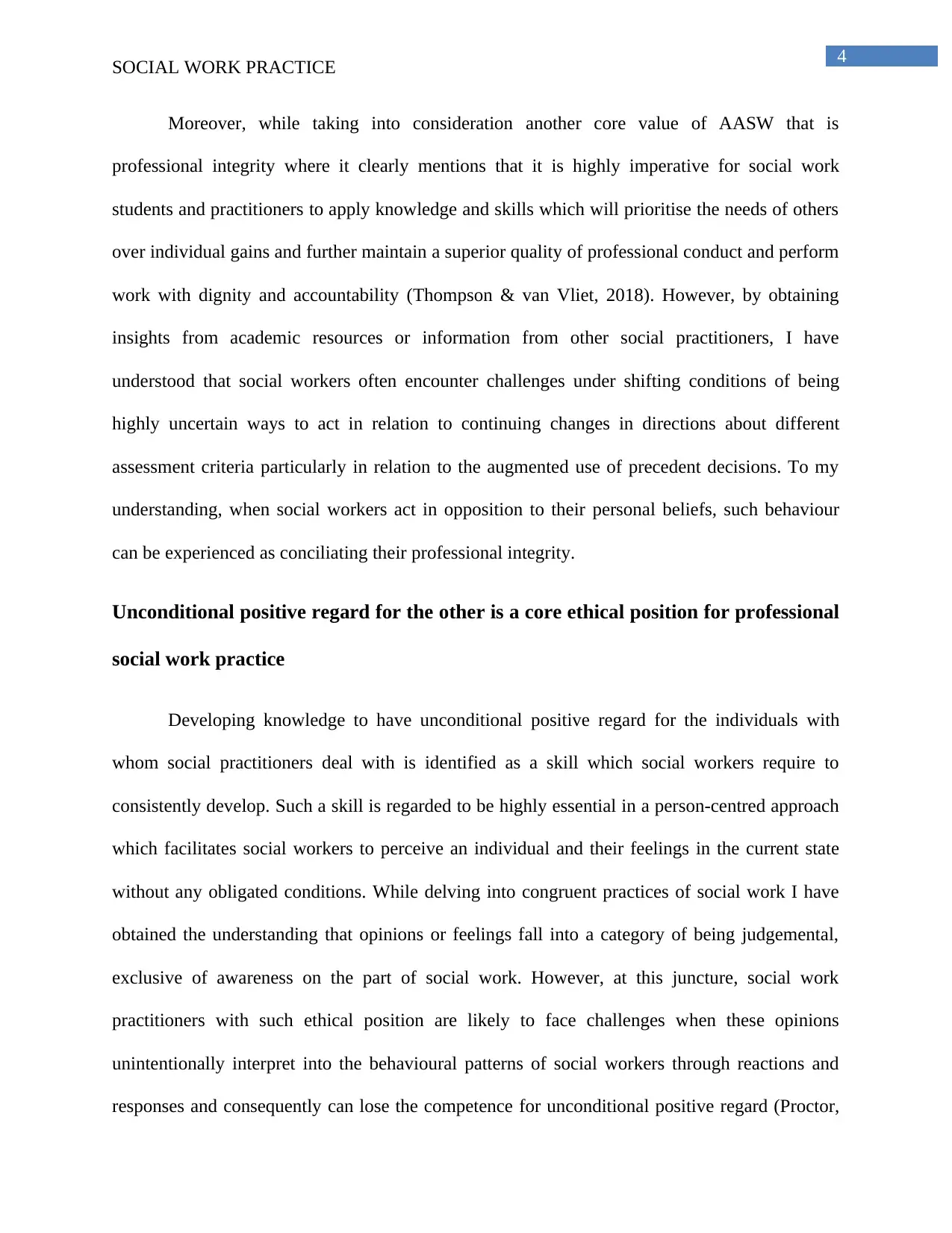
4
SOCIAL WORK PRACTICE
Moreover, while taking into consideration another core value of AASW that is
professional integrity where it clearly mentions that it is highly imperative for social work
students and practitioners to apply knowledge and skills which will prioritise the needs of others
over individual gains and further maintain a superior quality of professional conduct and perform
work with dignity and accountability (Thompson & van Vliet, 2018). However, by obtaining
insights from academic resources or information from other social practitioners, I have
understood that social workers often encounter challenges under shifting conditions of being
highly uncertain ways to act in relation to continuing changes in directions about different
assessment criteria particularly in relation to the augmented use of precedent decisions. To my
understanding, when social workers act in opposition to their personal beliefs, such behaviour
can be experienced as conciliating their professional integrity.
Unconditional positive regard for the other is a core ethical position for professional
social work practice
Developing knowledge to have unconditional positive regard for the individuals with
whom social practitioners deal with is identified as a skill which social workers require to
consistently develop. Such a skill is regarded to be highly essential in a person-centred approach
which facilitates social workers to perceive an individual and their feelings in the current state
without any obligated conditions. While delving into congruent practices of social work I have
obtained the understanding that opinions or feelings fall into a category of being judgemental,
exclusive of awareness on the part of social work. However, at this juncture, social work
practitioners with such ethical position are likely to face challenges when these opinions
unintentionally interpret into the behavioural patterns of social workers through reactions and
responses and consequently can lose the competence for unconditional positive regard (Proctor,
SOCIAL WORK PRACTICE
Moreover, while taking into consideration another core value of AASW that is
professional integrity where it clearly mentions that it is highly imperative for social work
students and practitioners to apply knowledge and skills which will prioritise the needs of others
over individual gains and further maintain a superior quality of professional conduct and perform
work with dignity and accountability (Thompson & van Vliet, 2018). However, by obtaining
insights from academic resources or information from other social practitioners, I have
understood that social workers often encounter challenges under shifting conditions of being
highly uncertain ways to act in relation to continuing changes in directions about different
assessment criteria particularly in relation to the augmented use of precedent decisions. To my
understanding, when social workers act in opposition to their personal beliefs, such behaviour
can be experienced as conciliating their professional integrity.
Unconditional positive regard for the other is a core ethical position for professional
social work practice
Developing knowledge to have unconditional positive regard for the individuals with
whom social practitioners deal with is identified as a skill which social workers require to
consistently develop. Such a skill is regarded to be highly essential in a person-centred approach
which facilitates social workers to perceive an individual and their feelings in the current state
without any obligated conditions. While delving into congruent practices of social work I have
obtained the understanding that opinions or feelings fall into a category of being judgemental,
exclusive of awareness on the part of social work. However, at this juncture, social work
practitioners with such ethical position are likely to face challenges when these opinions
unintentionally interpret into the behavioural patterns of social workers through reactions and
responses and consequently can lose the competence for unconditional positive regard (Proctor,
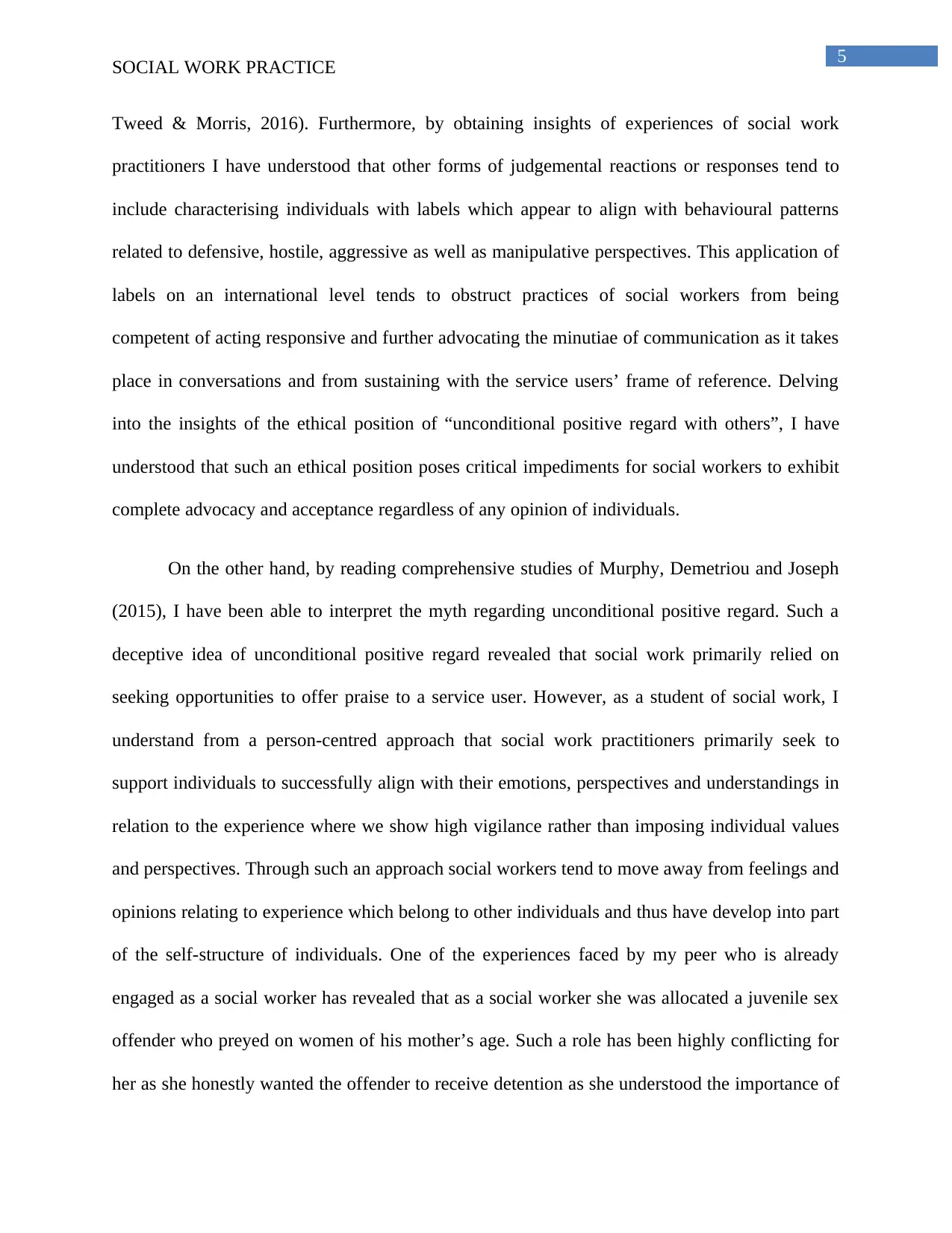
5
SOCIAL WORK PRACTICE
Tweed & Morris, 2016). Furthermore, by obtaining insights of experiences of social work
practitioners I have understood that other forms of judgemental reactions or responses tend to
include characterising individuals with labels which appear to align with behavioural patterns
related to defensive, hostile, aggressive as well as manipulative perspectives. This application of
labels on an international level tends to obstruct practices of social workers from being
competent of acting responsive and further advocating the minutiae of communication as it takes
place in conversations and from sustaining with the service users’ frame of reference. Delving
into the insights of the ethical position of “unconditional positive regard with others”, I have
understood that such an ethical position poses critical impediments for social workers to exhibit
complete advocacy and acceptance regardless of any opinion of individuals.
On the other hand, by reading comprehensive studies of Murphy, Demetriou and Joseph
(2015), I have been able to interpret the myth regarding unconditional positive regard. Such a
deceptive idea of unconditional positive regard revealed that social work primarily relied on
seeking opportunities to offer praise to a service user. However, as a student of social work, I
understand from a person-centred approach that social work practitioners primarily seek to
support individuals to successfully align with their emotions, perspectives and understandings in
relation to the experience where we show high vigilance rather than imposing individual values
and perspectives. Through such an approach social workers tend to move away from feelings and
opinions relating to experience which belong to other individuals and thus have develop into part
of the self-structure of individuals. One of the experiences faced by my peer who is already
engaged as a social worker has revealed that as a social worker she was allocated a juvenile sex
offender who preyed on women of his mother’s age. Such a role has been highly conflicting for
her as she honestly wanted the offender to receive detention as she understood the importance of
SOCIAL WORK PRACTICE
Tweed & Morris, 2016). Furthermore, by obtaining insights of experiences of social work
practitioners I have understood that other forms of judgemental reactions or responses tend to
include characterising individuals with labels which appear to align with behavioural patterns
related to defensive, hostile, aggressive as well as manipulative perspectives. This application of
labels on an international level tends to obstruct practices of social workers from being
competent of acting responsive and further advocating the minutiae of communication as it takes
place in conversations and from sustaining with the service users’ frame of reference. Delving
into the insights of the ethical position of “unconditional positive regard with others”, I have
understood that such an ethical position poses critical impediments for social workers to exhibit
complete advocacy and acceptance regardless of any opinion of individuals.
On the other hand, by reading comprehensive studies of Murphy, Demetriou and Joseph
(2015), I have been able to interpret the myth regarding unconditional positive regard. Such a
deceptive idea of unconditional positive regard revealed that social work primarily relied on
seeking opportunities to offer praise to a service user. However, as a student of social work, I
understand from a person-centred approach that social work practitioners primarily seek to
support individuals to successfully align with their emotions, perspectives and understandings in
relation to the experience where we show high vigilance rather than imposing individual values
and perspectives. Through such an approach social workers tend to move away from feelings and
opinions relating to experience which belong to other individuals and thus have develop into part
of the self-structure of individuals. One of the experiences faced by my peer who is already
engaged as a social worker has revealed that as a social worker she was allocated a juvenile sex
offender who preyed on women of his mother’s age. Such a role has been highly conflicting for
her as she honestly wanted the offender to receive detention as she understood the importance of
⊘ This is a preview!⊘
Do you want full access?
Subscribe today to unlock all pages.

Trusted by 1+ million students worldwide
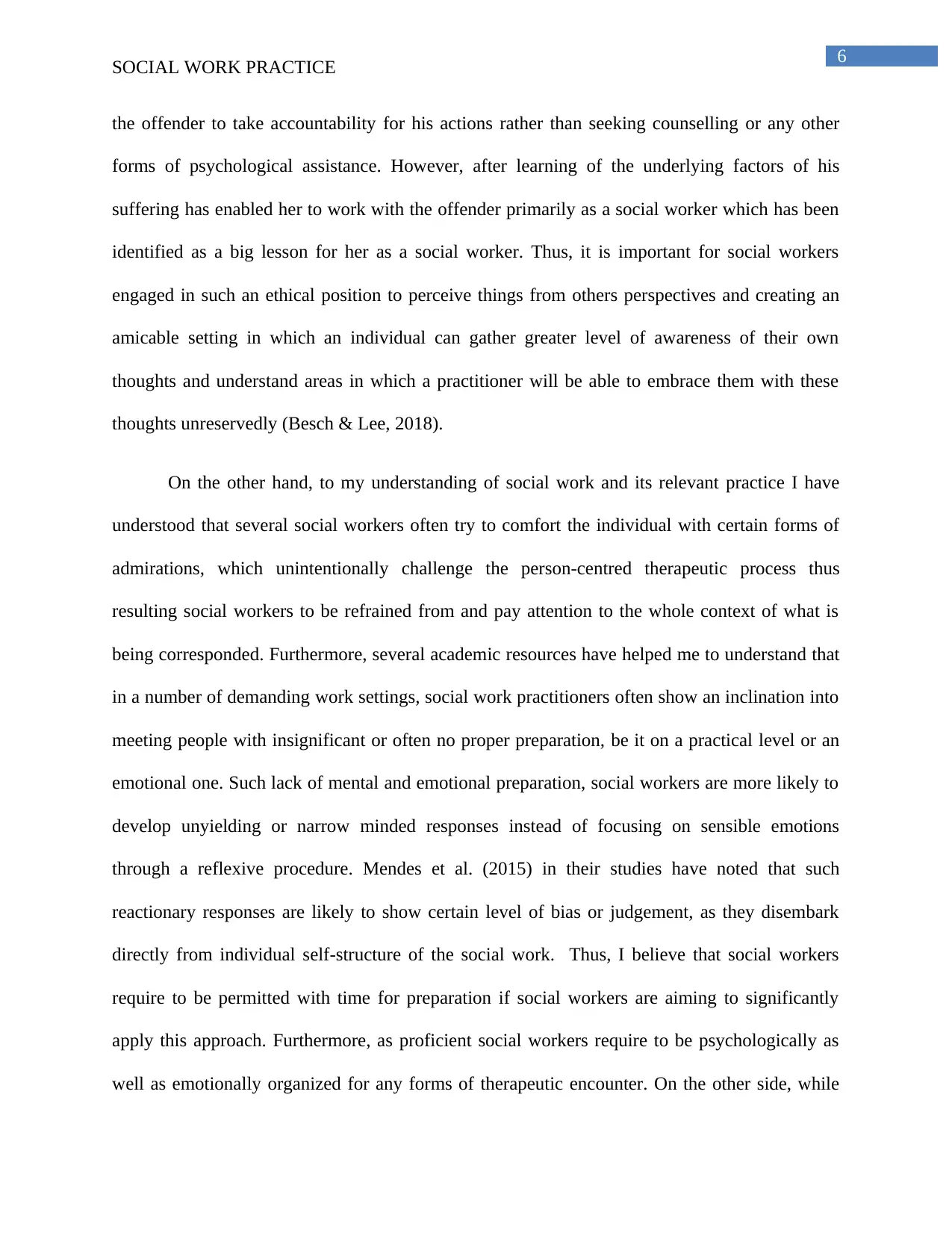
6
SOCIAL WORK PRACTICE
the offender to take accountability for his actions rather than seeking counselling or any other
forms of psychological assistance. However, after learning of the underlying factors of his
suffering has enabled her to work with the offender primarily as a social worker which has been
identified as a big lesson for her as a social worker. Thus, it is important for social workers
engaged in such an ethical position to perceive things from others perspectives and creating an
amicable setting in which an individual can gather greater level of awareness of their own
thoughts and understand areas in which a practitioner will be able to embrace them with these
thoughts unreservedly (Besch & Lee, 2018).
On the other hand, to my understanding of social work and its relevant practice I have
understood that several social workers often try to comfort the individual with certain forms of
admirations, which unintentionally challenge the person-centred therapeutic process thus
resulting social workers to be refrained from and pay attention to the whole context of what is
being corresponded. Furthermore, several academic resources have helped me to understand that
in a number of demanding work settings, social work practitioners often show an inclination into
meeting people with insignificant or often no proper preparation, be it on a practical level or an
emotional one. Such lack of mental and emotional preparation, social workers are more likely to
develop unyielding or narrow minded responses instead of focusing on sensible emotions
through a reflexive procedure. Mendes et al. (2015) in their studies have noted that such
reactionary responses are likely to show certain level of bias or judgement, as they disembark
directly from individual self-structure of the social work. Thus, I believe that social workers
require to be permitted with time for preparation if social workers are aiming to significantly
apply this approach. Furthermore, as proficient social workers require to be psychologically as
well as emotionally organized for any forms of therapeutic encounter. On the other side, while
SOCIAL WORK PRACTICE
the offender to take accountability for his actions rather than seeking counselling or any other
forms of psychological assistance. However, after learning of the underlying factors of his
suffering has enabled her to work with the offender primarily as a social worker which has been
identified as a big lesson for her as a social worker. Thus, it is important for social workers
engaged in such an ethical position to perceive things from others perspectives and creating an
amicable setting in which an individual can gather greater level of awareness of their own
thoughts and understand areas in which a practitioner will be able to embrace them with these
thoughts unreservedly (Besch & Lee, 2018).
On the other hand, to my understanding of social work and its relevant practice I have
understood that several social workers often try to comfort the individual with certain forms of
admirations, which unintentionally challenge the person-centred therapeutic process thus
resulting social workers to be refrained from and pay attention to the whole context of what is
being corresponded. Furthermore, several academic resources have helped me to understand that
in a number of demanding work settings, social work practitioners often show an inclination into
meeting people with insignificant or often no proper preparation, be it on a practical level or an
emotional one. Such lack of mental and emotional preparation, social workers are more likely to
develop unyielding or narrow minded responses instead of focusing on sensible emotions
through a reflexive procedure. Mendes et al. (2015) in their studies have noted that such
reactionary responses are likely to show certain level of bias or judgement, as they disembark
directly from individual self-structure of the social work. Thus, I believe that social workers
require to be permitted with time for preparation if social workers are aiming to significantly
apply this approach. Furthermore, as proficient social workers require to be psychologically as
well as emotionally organized for any forms of therapeutic encounter. On the other side, while
Paraphrase This Document
Need a fresh take? Get an instant paraphrase of this document with our AI Paraphraser
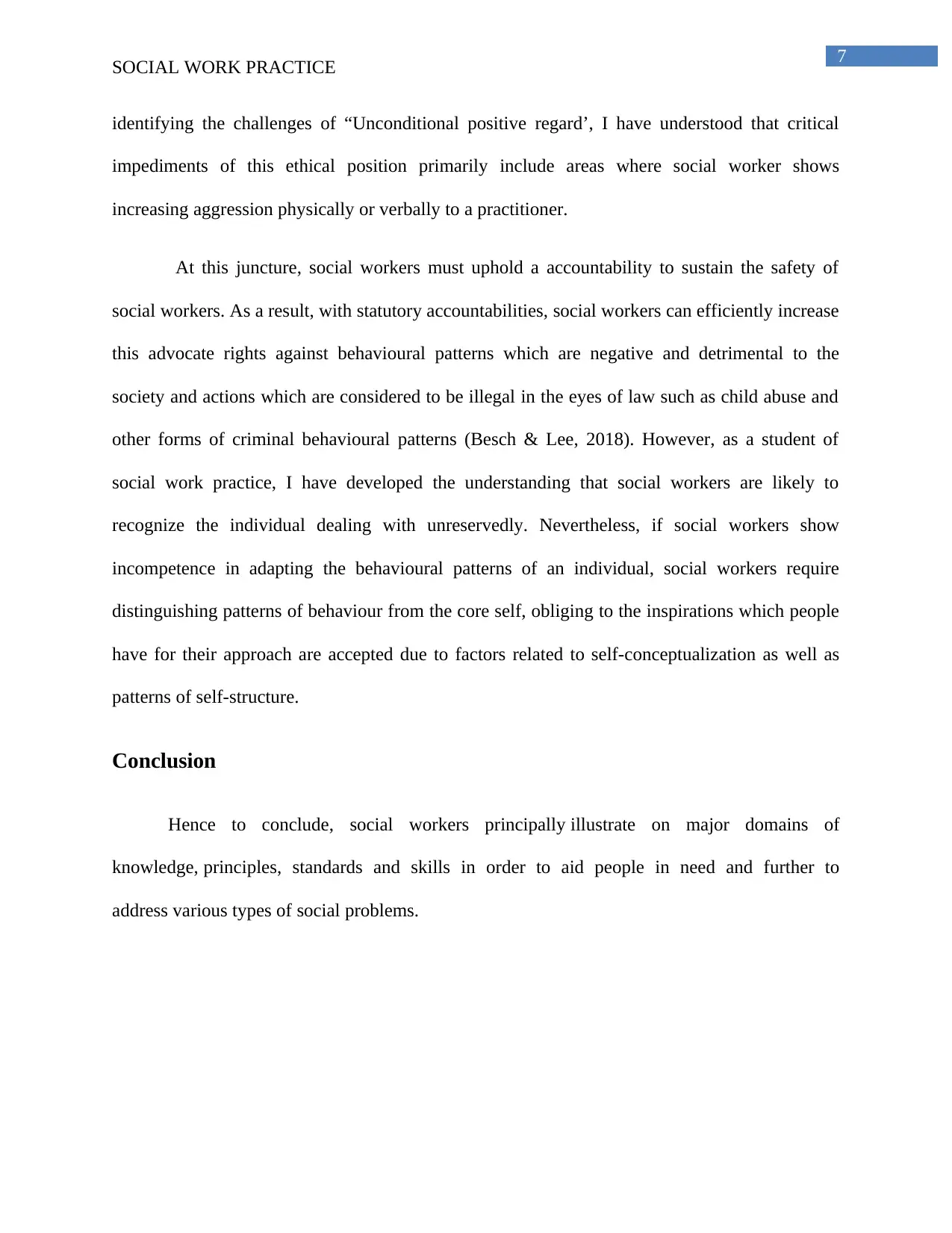
7
SOCIAL WORK PRACTICE
identifying the challenges of “Unconditional positive regard’, I have understood that critical
impediments of this ethical position primarily include areas where social worker shows
increasing aggression physically or verbally to a practitioner.
At this juncture, social workers must uphold a accountability to sustain the safety of
social workers. As a result, with statutory accountabilities, social workers can efficiently increase
this advocate rights against behavioural patterns which are negative and detrimental to the
society and actions which are considered to be illegal in the eyes of law such as child abuse and
other forms of criminal behavioural patterns (Besch & Lee, 2018). However, as a student of
social work practice, I have developed the understanding that social workers are likely to
recognize the individual dealing with unreservedly. Nevertheless, if social workers show
incompetence in adapting the behavioural patterns of an individual, social workers require
distinguishing patterns of behaviour from the core self, obliging to the inspirations which people
have for their approach are accepted due to factors related to self-conceptualization as well as
patterns of self-structure.
Conclusion
Hence to conclude, social workers principally illustrate on major domains of
knowledge, principles, standards and skills in order to aid people in need and further to
address various types of social problems.
SOCIAL WORK PRACTICE
identifying the challenges of “Unconditional positive regard’, I have understood that critical
impediments of this ethical position primarily include areas where social worker shows
increasing aggression physically or verbally to a practitioner.
At this juncture, social workers must uphold a accountability to sustain the safety of
social workers. As a result, with statutory accountabilities, social workers can efficiently increase
this advocate rights against behavioural patterns which are negative and detrimental to the
society and actions which are considered to be illegal in the eyes of law such as child abuse and
other forms of criminal behavioural patterns (Besch & Lee, 2018). However, as a student of
social work practice, I have developed the understanding that social workers are likely to
recognize the individual dealing with unreservedly. Nevertheless, if social workers show
incompetence in adapting the behavioural patterns of an individual, social workers require
distinguishing patterns of behaviour from the core self, obliging to the inspirations which people
have for their approach are accepted due to factors related to self-conceptualization as well as
patterns of self-structure.
Conclusion
Hence to conclude, social workers principally illustrate on major domains of
knowledge, principles, standards and skills in order to aid people in need and further to
address various types of social problems.
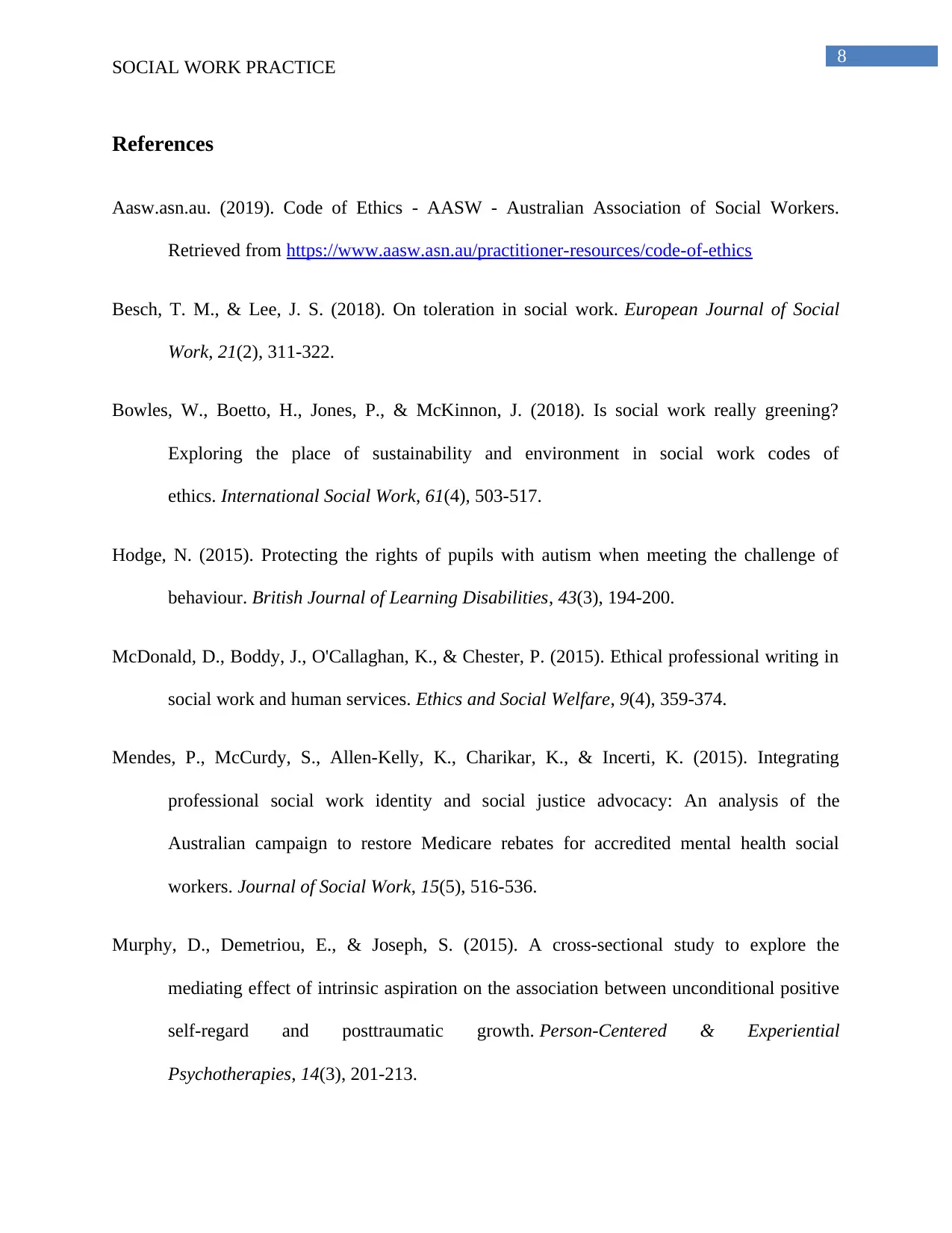
8
SOCIAL WORK PRACTICE
References
Aasw.asn.au. (2019). Code of Ethics - AASW - Australian Association of Social Workers.
Retrieved from https://www.aasw.asn.au/practitioner-resources/code-of-ethics
Besch, T. M., & Lee, J. S. (2018). On toleration in social work. European Journal of Social
Work, 21(2), 311-322.
Bowles, W., Boetto, H., Jones, P., & McKinnon, J. (2018). Is social work really greening?
Exploring the place of sustainability and environment in social work codes of
ethics. International Social Work, 61(4), 503-517.
Hodge, N. (2015). Protecting the rights of pupils with autism when meeting the challenge of
behaviour. British Journal of Learning Disabilities, 43(3), 194-200.
McDonald, D., Boddy, J., O'Callaghan, K., & Chester, P. (2015). Ethical professional writing in
social work and human services. Ethics and Social Welfare, 9(4), 359-374.
Mendes, P., McCurdy, S., Allen-Kelly, K., Charikar, K., & Incerti, K. (2015). Integrating
professional social work identity and social justice advocacy: An analysis of the
Australian campaign to restore Medicare rebates for accredited mental health social
workers. Journal of Social Work, 15(5), 516-536.
Murphy, D., Demetriou, E., & Joseph, S. (2015). A cross-sectional study to explore the
mediating effect of intrinsic aspiration on the association between unconditional positive
self-regard and posttraumatic growth. Person-Centered & Experiential
Psychotherapies, 14(3), 201-213.
SOCIAL WORK PRACTICE
References
Aasw.asn.au. (2019). Code of Ethics - AASW - Australian Association of Social Workers.
Retrieved from https://www.aasw.asn.au/practitioner-resources/code-of-ethics
Besch, T. M., & Lee, J. S. (2018). On toleration in social work. European Journal of Social
Work, 21(2), 311-322.
Bowles, W., Boetto, H., Jones, P., & McKinnon, J. (2018). Is social work really greening?
Exploring the place of sustainability and environment in social work codes of
ethics. International Social Work, 61(4), 503-517.
Hodge, N. (2015). Protecting the rights of pupils with autism when meeting the challenge of
behaviour. British Journal of Learning Disabilities, 43(3), 194-200.
McDonald, D., Boddy, J., O'Callaghan, K., & Chester, P. (2015). Ethical professional writing in
social work and human services. Ethics and Social Welfare, 9(4), 359-374.
Mendes, P., McCurdy, S., Allen-Kelly, K., Charikar, K., & Incerti, K. (2015). Integrating
professional social work identity and social justice advocacy: An analysis of the
Australian campaign to restore Medicare rebates for accredited mental health social
workers. Journal of Social Work, 15(5), 516-536.
Murphy, D., Demetriou, E., & Joseph, S. (2015). A cross-sectional study to explore the
mediating effect of intrinsic aspiration on the association between unconditional positive
self-regard and posttraumatic growth. Person-Centered & Experiential
Psychotherapies, 14(3), 201-213.
⊘ This is a preview!⊘
Do you want full access?
Subscribe today to unlock all pages.

Trusted by 1+ million students worldwide
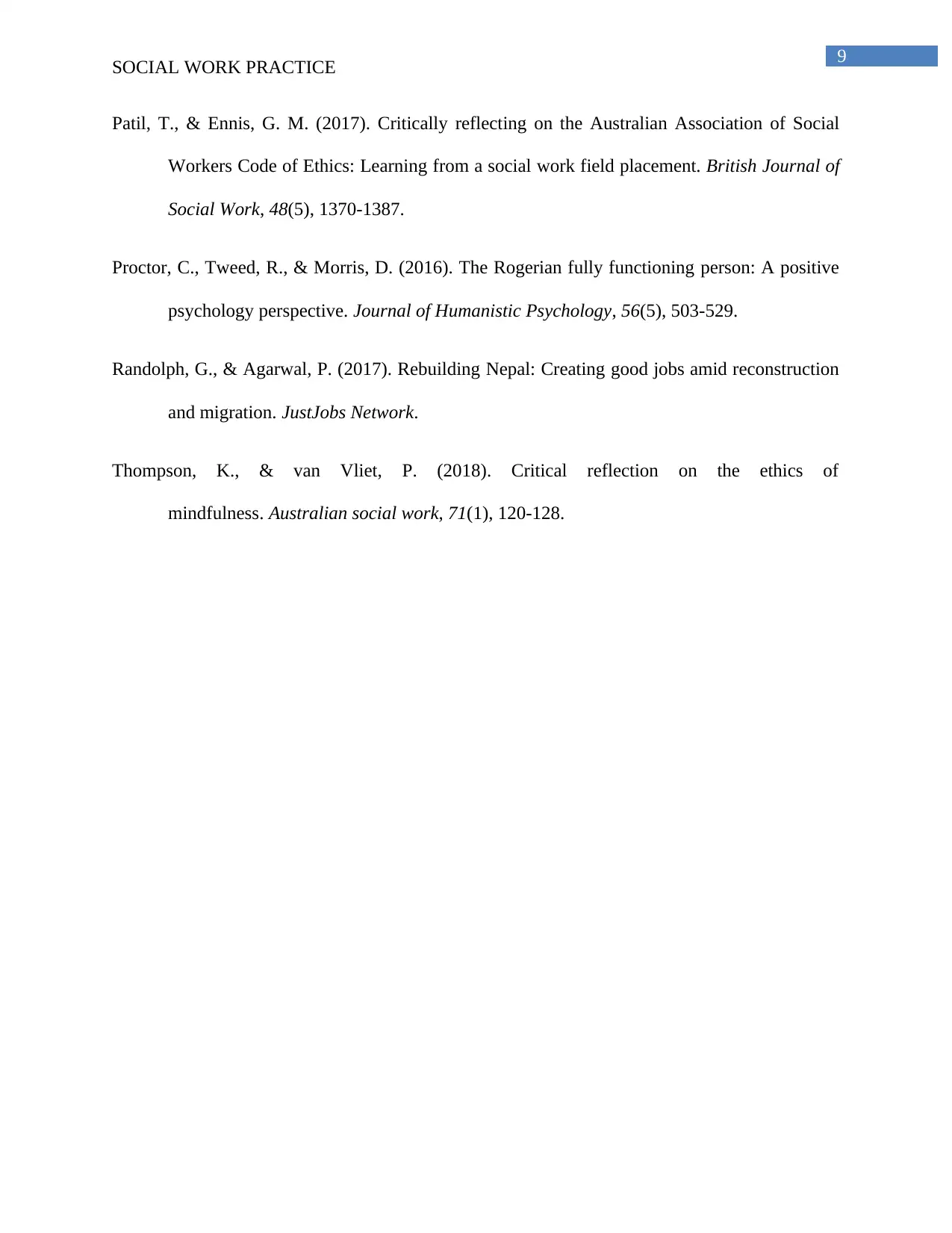
9
SOCIAL WORK PRACTICE
Patil, T., & Ennis, G. M. (2017). Critically reflecting on the Australian Association of Social
Workers Code of Ethics: Learning from a social work field placement. British Journal of
Social Work, 48(5), 1370-1387.
Proctor, C., Tweed, R., & Morris, D. (2016). The Rogerian fully functioning person: A positive
psychology perspective. Journal of Humanistic Psychology, 56(5), 503-529.
Randolph, G., & Agarwal, P. (2017). Rebuilding Nepal: Creating good jobs amid reconstruction
and migration. JustJobs Network.
Thompson, K., & van Vliet, P. (2018). Critical reflection on the ethics of
mindfulness. Australian social work, 71(1), 120-128.
SOCIAL WORK PRACTICE
Patil, T., & Ennis, G. M. (2017). Critically reflecting on the Australian Association of Social
Workers Code of Ethics: Learning from a social work field placement. British Journal of
Social Work, 48(5), 1370-1387.
Proctor, C., Tweed, R., & Morris, D. (2016). The Rogerian fully functioning person: A positive
psychology perspective. Journal of Humanistic Psychology, 56(5), 503-529.
Randolph, G., & Agarwal, P. (2017). Rebuilding Nepal: Creating good jobs amid reconstruction
and migration. JustJobs Network.
Thompson, K., & van Vliet, P. (2018). Critical reflection on the ethics of
mindfulness. Australian social work, 71(1), 120-128.
1 out of 10
Related Documents
Your All-in-One AI-Powered Toolkit for Academic Success.
+13062052269
info@desklib.com
Available 24*7 on WhatsApp / Email
![[object Object]](/_next/static/media/star-bottom.7253800d.svg)
Unlock your academic potential
Copyright © 2020–2026 A2Z Services. All Rights Reserved. Developed and managed by ZUCOL.




